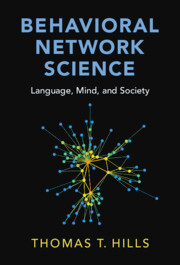Book contents
- Frontmatter
- Contents
- Additional Resources
- Introduction: Structure Matters
- Part I A Brief Guide to Network Science
- Part II Language
- Part III Mind
- Part IV Society
- 14 Network Illusions: How Structure Misleads Us
- 15 Group Problem Solving: Harnessing the Wisdom of the Crowds
- 16 The Segregation of Belief: How Structure Facilitates False Consensus
- 17 The Conspiracy Frame: Coherence through Self-Supporting Beliefs
- 18 The Kennedy Paradox: Games of Conflict and Escalation
- 19 Fund People Not Projects: A Universal Basic Income for Research
- References
- Index
16 - The Segregation of Belief: How Structure Facilitates False Consensus
from Part IV - Society
Published online by Cambridge University Press: 08 November 2024
- Frontmatter
- Contents
- Additional Resources
- Introduction: Structure Matters
- Part I A Brief Guide to Network Science
- Part II Language
- Part III Mind
- Part IV Society
- 14 Network Illusions: How Structure Misleads Us
- 15 Group Problem Solving: Harnessing the Wisdom of the Crowds
- 16 The Segregation of Belief: How Structure Facilitates False Consensus
- 17 The Conspiracy Frame: Coherence through Self-Supporting Beliefs
- 18 The Kennedy Paradox: Games of Conflict and Escalation
- 19 Fund People Not Projects: A Universal Basic Income for Research
- References
- Index
Summary
The false consensus effect is the observation that people tend to overestimate the number of people who share their views. In modern environments we also see growing evidence of greater polarization. For example, according to the Pew Research Center over the past five decades, congressional US Democrat and Republican ideologies have increasingly diverged, with an ever shrinking middle ground. This is appears to also be reflected among US citizens, with a "disappearing center" hastened by growing “anarchist” and “anti-establishment” ideologies. Many have speculated that this polarization is a global phenomenon. The question we pose here is how beliefs and network structure might interact to facilitate both false consensus effects and rising polarization.
Keywords
Information
- Type
- Chapter
- Information
- Behavioral Network ScienceLanguage, Mind, and Society, pp. 258 - 277Publisher: Cambridge University PressPrint publication year: 2024
